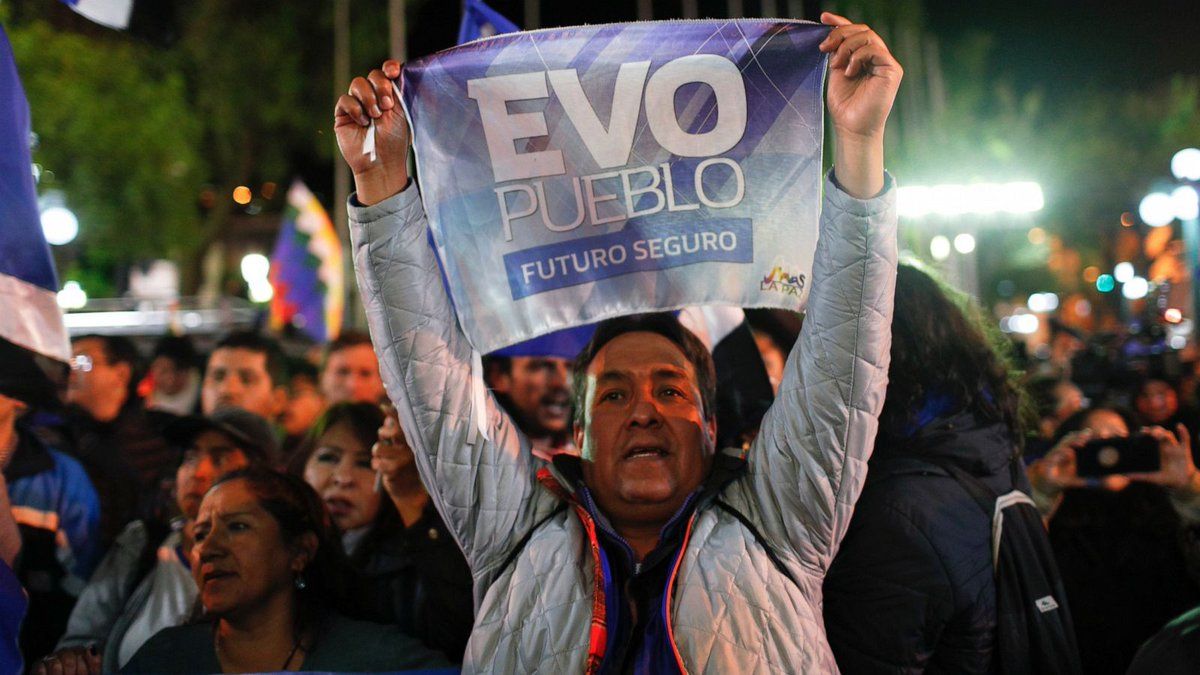-
Watching in full the speech in which Evo Morales unwittingly coined the name of the uprising that would overthrow him: "pitita." His speech to a crowd of supporters in Cochabamba's Plaza 14 de Septiembre, four days after the election is here: youtube.com/watch?v=S1EB6ezOGsQ
-
Notable features… 1. For a presidential candidate, Evo's stump speech against his opponent, Carlos Mesa, is pretty dated. Focuses heavily on "gastos reservados" (= expense account) from Mesa's 2002-03 vice presidency.
-
2. We're in the short period when Morales' side had the moral high ground on tactics. Fresh in everyone's mind is the burning of electoral offices by the opposition that I tweeted about last night: @CarwilBJ/1481142426311999490
-
3. Evo Morales has an awkward relationship with his own cult of personality. When the crowd chants "Evo, Evo," he corrects them, urges a chant of "Pueblo, Pueblo." (People, People)
-
4. Morales publicly calls on his supporters to show "much strength, much unity; unity, unity unity" and to stay peaceful (reinforcing #2).
-
"And I want to ask you, brother leaders, delegates, do not enter into provocation. They are looking for a dead person to bring convulsion to the country, as they have in other countries. And here we are not going to offer them one…"
-
"Aguantemos" / "We will bear it." "We are going to defend democracy, and we are going to respect the vote of the Bolivian people."
-
That's the last sentence before the pititas talk begins.
-
5. The opposition had declared a national strike for the next day. "What strike?," Evo asks. And then he begins to say the only thing that most narratives remember of that day…
-
"I remember… one time they had convened a meeting of the civic committee in Cochabamba … I came and they agreed on a strike so that the government would provide money for a new airport. Fine, for a just demand of [Cochabamba] department, everyone must support it. …
-
"But on the day of the strike, everyone disappeared from the strike." "Que pititas amarrando" / "What little ropes they strung. "What cars? Nothing. It was a just demand." But no one showed up, closed their doors, participated. "It surprised me," he will add in a minute.
-
First Evo makes an aside, arguing that social demands and things that provide development to the region are what blockades should fight for (and presumably not to change the election results).
-
Now the famous quote: "Ahora dos, tres personas amarrando 'pititas', poniendo 'llantitas', qué paro es ese?" "And now, two, three people stringing little ropes, putting out little tires. What kind of strike is this?"
-
6. An ill-fated comparison follows. Evo argues that when one sector goes on strike with a just demand—(he also says a just economic or development demand)—thousands upon thousands will join them. Of course, many thousands would march against him shortly.
-
7. Remembering one march from Patacamaya, Evo Morales says, "I could give them a workshop, a seminar on how to march, so they may learn."
-
8. "This so-called national strike is a coup-plotting (golpista) strike." And he recommends to youth to not be bought (into participating), to not be submissive to the United States, to defend the dignity of Bolivia.
-
9. Morales effectively calls for a contest of the mobilizing capacity of the two sides. Celebrates the turnout "in 24 hours" in La Paz's Plaza San Francisco and in two days in Cochabamba, overflowing the plaza, and he promises the road from Caracollo to La Paz.
